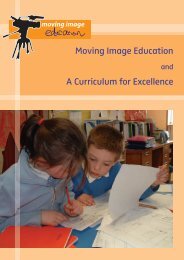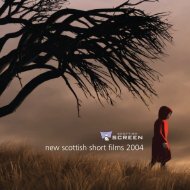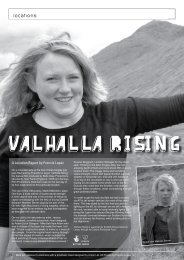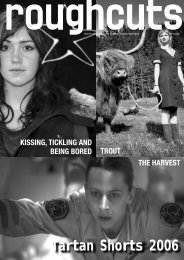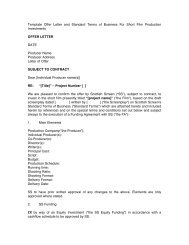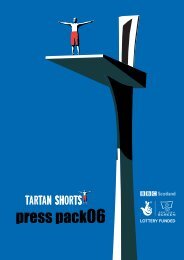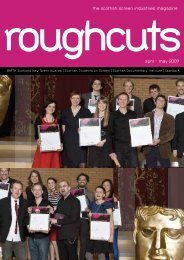Evaluation - Scottish Screen
Evaluation - Scottish Screen
Evaluation - Scottish Screen
You also want an ePaper? Increase the reach of your titles
YUMPU automatically turns print PDFs into web optimized ePapers that Google loves.
Without exception, the teachers involved in each of the three initiatives indicated that their<br />
appreciation and enjoyment of film had increased as a direct consequence of involvement in<br />
the Programme. Many were also able to extrapolate from the programme to their awareness<br />
of visual images in other contexts and to make connections between visual and verbal<br />
literacies.<br />
Within focus groups, most young people also reported that they now thought about features<br />
such as camera angle, lighting and setting when they watched film and television. The young<br />
people also reported that they enjoyed learning through visual media.<br />
The comments of both teachers and pupils were supported by the data gathered during<br />
observations of MIE sessions in each of the locations involved.<br />
To what extent have teachers participating in the initiatives developed a new<br />
relationship between the teacher and the learner?<br />
Evidence from the evaluation suggests that, at least in the context of MIE lessons, the<br />
relationship between teachers and learners shifted in those contexts where MIE survived<br />
beyond its initial stages. Teachers and pupils attributed change directly to the developments<br />
in teaching and learning evidenced in this report and discussed below. In many instances,<br />
teachers and pupils were able to see each other ‘in a new light’. Pupils appreciated that their<br />
teachers were often less directive and more supportive during MIE lessons. A number of<br />
teachers commented on the surprising quality of contributions from some pupils and the hard<br />
work and engagement of children who were more likely to be disengaged in other lessons.<br />
Have participating teachers changed their teaching strategies in response to their<br />
involvement in the initiatives? If so, to what extent?<br />
In the initial stages of their engagement with the programme, the majority of teachers<br />
considered that MIE would be assimilated into their current teaching strategies, especially<br />
group work, questioning and discussion. A few, however, recognised the possibilities for<br />
further development offered by the opportunities presented for collaborative learning and for<br />
pupils’ ideas to guide the work of the class. As they gained in confidence and familiarity<br />
with MIE, the majority of teachers changed teaching strategies, at least during MIE lessons.<br />
This was especially the case in clusters A and B where the teachers had more time to engage<br />
with the programme. Observation in all clusters generated evidence of teachers using<br />
strategies that can be understood in terms of active learning, critical skills, metacognition and<br />
the social construction of learning. For many of these teachers, this represented a significant<br />
shift from their previous practice. From interview data, however, there was less evidence of<br />
these strategies permeating teaching in all curricular areas, mostly as a consequence of the<br />
constraints of having to teach to a set curriculum.<br />
Classroom assistants had also become involved in the teaching of MIE in ways that resulted<br />
in them having a greater contribution to make and hence feeling more valued and equal. It<br />
may be the case therefore, that MIE provides a useful context for collaboration among adults<br />
as well as pupils.<br />
Have the pupils responded to any such changes?<br />
49





